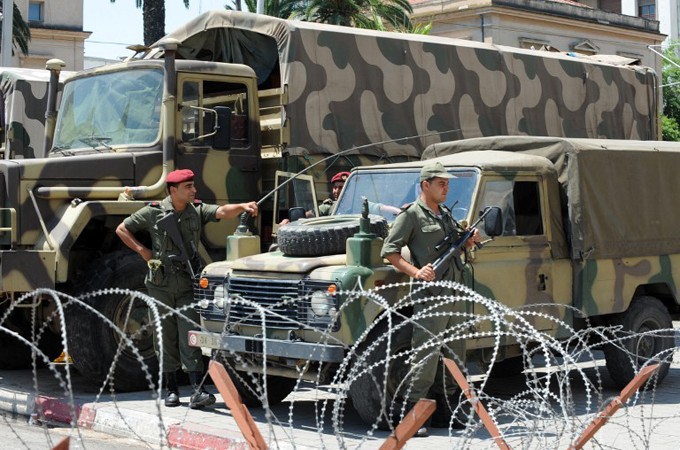(VOVworld)- Tunisia, the country that was most successful in transiting to democracy after the “Arab Spring” is engulfed by a political crisis. Since the Jasmine revolution in March 2011, disputes within the coalition government and increasing protests from the opposition party have been threatening to trigger a second revolution there.

Tunisian soldiers stand guard on the fringes of an anti-government demonstration on the Habib Bourguiba Avenue on July 26, 2013 in Tunis after the killing of the opposition politician Mohamed Brahmi [AFP]
|
In recent days, thousands of Tunisians have taken to the streets to protest the government. The scenes on the streets of Tunisia recall what happened there two years ago, when Mohamed Bouaziz burned himself to protest the government’s suppression of street vendors. Anger quickly spread throughout the country, turned into the Jasmine revolution, resulted in a coup that overthrew President Ben Ali, and provoked an “Arab Spring” revolution throughout the Middle East and North Africa.
Compared to other countries in the region, where revolutions took place, the political transition in Tunisia was quite smooth. A few months after Ben Ali was deposed, the first democratic election was held, making Tunisians believe a new political era had begun. However, hope for the transition faded due to lingering differences between the opposition party and the ruling Muslim party. The assassination of leading opposition figure Chokri Belaid last February and MP Mohamed Brahmi last month has plunged Tunisia into violence. Many Tunisians blame the Ennahda Party for these two assassinations. Though Interior Minister Lotfo Ben Jeddou indicated last July that a member of the Sunni Salafist Movement murdered Brahmi, this did not ease the opposition’s anger. Opposition protestors demanded that the government resign.
The reform process in Tunisia might have been smoother if the political turmoil in Egypt had not happened, ending the short leadership of President Mohamed Morsi. Recent events in Egypt have inspired Tunisian protestors. The transition to democracy and resulting political turmoil in these two countries has provoked fears that Tunisia might become a second Egypt. A perceived attempt by Ennahda, the biggest party in Tunisia’s coalition government to turn Tunisia into a Muslim country is the reason behind the political crisis in this country.
Tunisia is facing an emergence of the Islamic Jihad, a group linked to Al Qeada that is in the bushy valleys and caves of the mountain area bordering Algeria. Last month, 8 Tunisian soldiers were killed in a clash with these terrorists. For this, the opposition party accused the government of failing to confront extremist Muslim groups. The public’s disappointment with the government has increased since the unemployment rate reached 18% and the economy stagnated. Under pressure from the protests, the Tunisian Prime Minister and leader of the ruling Ehhadha party agreed with all proposals to move towards a new coalition government and called for an early general election on December 17.